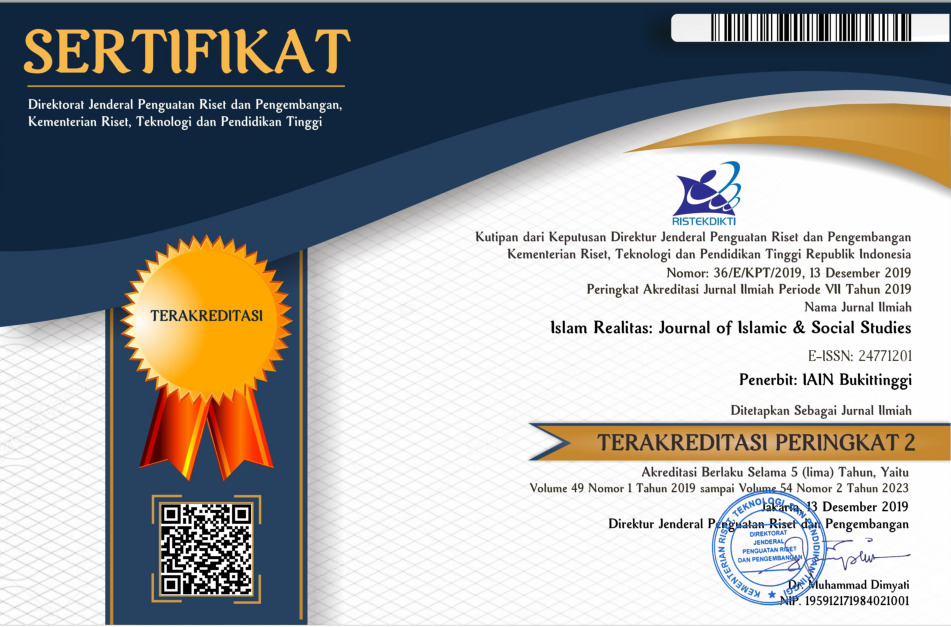Between Halal and Haram: The Challenges and Adaptation of Halal Dietary Consumption Indonesian Muslim Immigrants in Japan
Downloads
Additional Files
This study examines the challenges and adaptation strategies of Halal food consumption by Indonesian Muslim immigrants in Japan. Since April 2019, Japan’s government decided to accept foreign workers under Specified Skills Visa Program to address the labor shortages in the country. This new policy will encourage more Muslim immigrants from Indonesia to search for higher income in Japan. The growing population of Muslim immigrants in Japan and inbound tourists from Islamic countries has triggered the development of Halal food products in Japan. The research uses a qualitative approach supplemented with semi-structured interviews of Indonesian Muslim Immigrants from various locations in Japan. This study has found that the Indonesian Muslim immigrants face three challenges to maintain their Halal dietary consumption. The different culture of social life has put social pressure on Muslim immigrants to follow the Japanese drinking and hangout habits. The difficulties of accessibility and a lack of variety of Halal food products make it a less appealing choice for busy-scheduled people. There is no legal body that has the authority to give Halal certification. Theory of deviance typology is used to analyze the adaptation strategy formed as the result of these challenges. There are four types of adaptation strategy formed by Indonesia Muslim immigrants: Conformity, Innovation, Ritualism, and Retreatism.
Penelitian ini mengkaji tentang tantangan dan strategi adaptasi konsumsi makanan halal oleh imigran Muslim Indonesia di Jepang. Sejak April 2019, pemerintah Jepang memutuskan untuk menerima pekerja asing di bawah Program Visa Keterampilan Khusus untuk mengatasi kekurangan tenaga kerja di Jepang. Kebijakan baru ini akan mendorong lebih banyak imigran Muslim dari Indonesia untuk mencari penghasilan yang lebih tinggi di Jepang. Meningkatnya populasi imigran Muslim di Jepang dan masuknya turis dari negara-negara Islam telah memicu berkembangnya produk makanan Halal di Jepang. Penelitian ini menggunakan pendekatan kualitatif yang dilengkapi dengan wawancara semi terstruktur terhadap Imigran Muslim Indonesia dari berbagai lokasi di Jepang. Studi ini menemukan bahwa para imigran Muslim Indonesia memiliki tiga tantangan untuk mempertahankan konsumsi makanan halal mereka. Budaya kehidupan sosial yang berbeda telah memberikan tekanan sosial bagi imigran Muslim untuk mengikuti kebiasaan minum alkohol dan cara pergaulan orang Jepang. Kesulitan aksesibilitas dan kurangnya variasi produk makanan halal menjadikannya pilihan yang kurang menarik bagi orang-orang dengan jadwal sibuk. Tidak ada satu pun badan hukum yang berwenang memberikan sertifikasi halal. Teori tipologi penyimpangan digunakan untuk menganalisis strategi adaptasi yang terbentuk akibat tantangan tersebut. Ada empat jenis strategi adaptasi yang dibentuk oleh Imigran Muslim Indonesia: Conformity, Innovation, Ritualism, and Retreatism.
Journals
Ainur Rofiq & Titan Achsan, ‘Examining the Impacts of Religiosity , Attitude , and Subjective Norm Toward Intention to Purchase Halal Food : A Study on Indonesian Muslim Consumers’, Jurnal Ilmiah Mahasiswa Fakultas Ekonomi Dan Bisnis, 05 (2017)
<https://jimfeb.ub.ac.id/index.php/jimfeb/article/view/3850>
Amin, Ali, ‘From Mushalla to Mosque: The Formation of South and Southeast Asian Muslim Communities in Japan’, Al-Albab, 8.1 (2019), 3 <https://doi.org/10.24260/alalbab.v8i1.1050>
Annabi, Carrie Amani, and Olufunbi Olajumoke Ibidapo-Obe, ‘Halal Certification Organizations in The United Kingdom: An Exploration of Halal Cosmetic Certification’, Journal of Islamic Marketing, 8.1 (2017), 107–26 <https://doi.org/10.1108/JIMA-06-2015-0045>
Arata, Mariko, ‘Getting Halal Food in the Netherlands: From Indonesian Consumers’ Perspective’, in Proceedings of the International Workshop on Halal Food Consumption in East and West, 2018, pp. 35–48 <https://www.academia.edu/>
Deniar, Shannaz Mutiara, and Tonny Dian Effendi, ‘Halal Food Diplomacy in Japan and South Korea’, Journal of Social and Political Sciences, 2.3 (2019), 805–13 <https://doi.org/10.31014/aior.1991.02.03.121>
Fasa, Muhammad Iqbal, ‘Critical Review: Is Religiousity an Important Determinant on Muslim Consumer Behavior in Malaysia?’, IJRDO-Journal of Applied Management Science, 2.8 (2016), 13–21
Fathil, Fauziah, and Fathiah Fathil, ‘Islam in Minority Muslim Countries: A Case Study on Japan and Korea’, World Journal of Islamic History and Civilization, 1.2 (2011), 130–41 <http://irep.iium.edu.my/24131/>
Mokhlis, Safiek, ‘Relevancy and Measurement of Religiosity in Consumer Behavior Research’, International Business Research, 2.3 (2009) <https://doi.org/10.5539/ibr.v2n3p75>
Murphy, Daniel S., and Mathew B. Robinson, ‘The Maximizer: Clarifying Merton’s Theories of Anomie and Strain’, Theoretical Criminology, 12.4 (2008), 501–21 <https://doi.org/10.1177/1362480608097154>
Nakano, Sachiko, Yuri Okunishi, and Tomoko Tanaka, ‘在日ムスリム留å¦ç”Ÿã®ç¤¾ä¼šç”Ÿæ´»ä¸Šã®å›°é›£"Social Life Difficulties of Muslim Students in Japan"’, 岡山大å¦å¤§å¦é™¢ç¤¾ä¼šæ–‡åŒ–科å¦ç ”究科紀è¦, 39, 2015, 137–51 <http://ci.nii.ac.jp/naid/120005593532/ja/>Ainur Rofiq & Titan Achsan, ‘Examining the Impacts of Religiosity , Attitude , and Subjective Norm Toward Intention to Purchase Halal Food : A Study on Indonesian Muslim Consumers’, Jurnal Ilmiah Mahasiswa Fakultas Ekonomi Dan Bisnis, 05 (2017) <https://jimfeb.ub.ac.id/index.php/jimfeb/article/view/3850>
Amin, Ali, ‘From Mushalla to Mosque: The Formation of South and Southeast Asian Muslim Communities in Japan’, Al-Albab, 8.1 (2019), 3 <https://doi.org/10.24260/alalbab.v8i1.1050>
Annabi, Carrie Amani, and Olufunbi Olajumoke Ibidapo-Obe, ‘Halal Certification Organizations in The United Kingdom: An Exploration of Halal Cosmetic Certification’, Journal of Islamic Marketing, 8.1 (2017), 107–26 <https://doi.org/10.1108/JIMA-06-2015-0045>
Arata, Mariko, ‘Getting Halal Food in the Netherlands: From Indonesian Consumers’ Perspective’, in Proceedings of the International Workshop on Halal Food Consumption in East and West, 2018, pp. 35–48 <https://www.academia.edu/>
BP2MI, Data Penempatan Dan Pelindungan Pekerja Migran Indonesia (PMI) Tahun 2019, 2019 <https://bp2mi.go.id/uploads/statistik/images/data_19-02-2020_Laporan_Pengolahan_Data_BNP2TKI____2019(2).pdf>
Deniar, Shannaz Mutiara, and Tonny Dian Effendi, ‘Halal Food Diplomacy in Japan and South Korea’, Journal of Social and Political Sciences, 2.3 (2019), 805–13 <https://doi.org/10.31014/aior.1991.02.03.121>
DinarStandard, ‘State of the Global Islamic Economy Report 2020/2021’, Salaam Gateway, 2019, 3–4 <https://cdn.salaamgateway.com/special-coverage/sgie19-20/full-report.pdf>
Fasa, Muhammad Iqbal, ‘Critical Review: Is Religiousity An Important Determinant On Muslim Consumer Behavior In Malaysia?’, IJRDO-Journal of Applied Management Science, 2.8 (2016), 13–21
Fathil, Fauziah, and Fathiah Fathil, ‘Islam in Minority Muslim Countries: A Case Study on Japan and Korea’, World Journal of Islamic History and Civilization, 1.2 (2011), 130–41 <http://irep.iium.edu.my/24131/>
Hajis, Hiji, ‘The Number of Muslims in Japan Is Growing Fast’, The Economist, 2021 <https://www.economist.com/asia/2021/01/07/the-number-of-muslims-in-japan-is-growing-fast>
Halawa, Abdelhadi, ‘Acculturation of Halal Food to the American Food Culture through Immigration and Globalization: A Literature Review’, Journal of Ethnic and Cultural Studies, 5.2 (2018), 53–63 <https://doi.org/10.29333/ejecs/89>
Jasso, ‘Result of an Annual Survey of International Students in Japan 2020’, March, 2021, 1–4 <https://www.studyinjapan.go.jp/en/_mt/2021/04/date2020z_e.pdf>
Mokhlis, Safiek, ‘Relevancy and Measurement of Religiosity in Consumer Behavior Research’, International Business Research, 2.3 (2009) <https://doi.org/10.5539/ibr.v2n3p75>
Murphy, Daniel S., and Mathew B. Robinson, ‘The Maximizer: Clarifying Merton’s Theories of Anomie and Strain’, Theoretical Criminology, 12.4 (2008), 501–21 <https://doi.org/10.1177/1362480608097154>
Nakano, Sachiko, Yuri Okunishi, and Tomoko Tanaka, ‘在日ムスリム留å¦ç”Ÿã®ç¤¾ä¼šç”Ÿæ´»ä¸Šã®å›°é›£"Social Life Difficulties of Muslim Students in Japan"’, 岡山大å¦å¤§å¦é™¢ç¤¾ä¼šæ–‡åŒ–科å¦ç ”究科紀è¦, 39, 2015, 137–51 <http://ci.nii.ac.jp/naid/120005593532/ja/>
Nakhleh, Emile A, Keiko Sakurai, and Michael Penn, ‘Islam in Japan: A Cause for Concern?’, Asia Policy, 5.5 (2008), 61–104
Oki, Yoshinori, Mitsui & Co. Global Strategic Studies Institute Monthly Report May 2019, 2019 <https://www.mitsui.com/mgssi/en/report/detail/__icsFiles/afieldfile/2019/07/03/1905d_oki_e.pdf>
Pradana, M., R. Huertas-GarcÃa, and F. Marimon, ‘Purchase Intention of Halal Food Products in Spain: The Moderating Effect of Religious Involvement’, International Food Research Journal, 27.4 (2020), 735–44
Ramly, Zulkufly, Lau Teck Chai, and Choe Kum Lung, ‘Religiosity as a Predictor of Consumer Ethical Behaviour: Some Evidence from Young Consumers from Malaysia’, Journal of Business Systems, Governance and Ethics, 3.4 (2008) <https://doi.org/10.15209/jbsge.v3i4.147>
Rehman, Ateeqâ€urâ€, and Muhammad Shahbaz Shabbir, ‘The Relationship Between Religiosity and New Product Adoption’, Journal of Islamic Marketing, 1.1 (2010), 63–69 <https://doi.org/10.1108/17590831011026231>
SESRIC, ‘Muslim Communities and Minorities in Non-OIC Member States: Japan’, Global Muslim Diaspora Project. Human and Social Development Studies., 2019, 8
Tanada, Hirofumi, ‘“Estimate of Muslim Population in the World and Japan, 2018†料 世界ã¨æ—¥æœ¬ã®ãƒ ス ãƒªãƒ äººå£ 2018 å¹´ 店田 廣文’, Ningenkagaku KenkyÅ«, 32.2 (2019), 253–62
Wahidati, Lufi, and Eska Nia Sarinastiti, ‘Perkembangan Wisata Halal Di Jepang’, Jurnal Gama Societa, 1.1 (2018), 9–19
Yakin, Ayang utriya, and Ima Sri Rahmani, ‘Halal Food Consumption among the Indonesian Muslim Minority in Belgium’, in Proceedings of the International Workshop on ‘Halal Food Consumption in East and West’ (Tokyo: Institute for Asian Muslim Studies, Waseda University, 2018), pp. 123–50
Yamaguchi, Hiroko Kurosaki, ‘The Potential and Challenge of Halal Foods in Japan’, Journal of Asian Rural Studies, 3.1 (2019), 1 <https://doi.org/10.20956/jars.v3i1.1712>
Yulita, Irma Rachmi, and Susy Ong, ‘The Changing Image of Islam in Japan: The Role of Civil Society in Disseminating Better Information about Islam’, Al-Jami’ah, 57.1 (2019), 51–82 <https://doi.org/10.14421/ajis.2019.571.51-82>
Online Database
BP2MI, Data Penempatan Dan Pelindungan Pekerja Migran Indonesia (PMI) Tahun 2019, 2019 <https://bp2mi.go.id/uploads/statistik/images/data_19-02-2020_Laporan_Pengolahan_Data_BNP2TKI____2019(2).pdf>
DinarStandard, ‘State of the Global Islamic Economy Report 2020/2021’, Salaam Gateway, 2019, 1–178 <https://cdn.salaamgateway.com/special-coverage/sgie19-20/full-report.pdf>
Hajis, Hiji, ‘The Number of Muslims in Japan Is Growing Fast’, The Economist, 2021 <https://www.economist.com/asia/2021/01/07/the-number-of-muslims-in-japan-is-growing-fast>
Jasso, ‘Result of an Annual Survey of International Students in Japan 2020’, March, 2021 <https://www.studyinjapan.go.jp/en/_mt/2021/04/date2020z_e.pdf>
Nakhleh, Emile A, Keiko Sakurai, and Michael Penn, ‘Islam in Japan: A Cause for Concern?’, Asia Policy, 5.5 (2008), 61–104
Oki, Yoshinori, Mitsui & Co. Global Strategic Studies Institute Mnthly Report May 2019, 2019 <https://www.mitsui.com/mgssi/en/report/detail/__icsFiles/afieldfile/2019/07/03/1905d_oki_e.pdf>
Authors who publish with this journal agree to the following terms:
- Authors retain copyright and grant the journal right of first publication with the work simultaneously licensed under a Creative Commons Attribution License that allows others to share the work with an acknowledgment of the work's authorship and initial publication in this journal.
- Authors are able to enter into separate, additional contractual arrangements for the non-exclusive distribution of the journal's published version of the work (e.g., post it to an institutional repository or publish it in a book), with an acknowledgment of its initial publication in this journal.
- Authors are permitted and encouraged to post their work online (e.g., in institutional repositories or on their website) prior to and during the submission process, as it can lead to productive exchanges, as well as earlier and greater citation of published work (See The Effect of Open Access).









